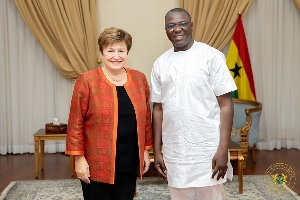The Government of Ghana, through the Finance Ministry, in collaboration with the International Monetary Fund (IMF), is looking for new revenue streams to augment the country’s revenue fall following the suspension of the Value Added Tax (VAT) on electricity.
Speaking on Ghana’s decision to abolish the VAT on electricity, the IMF acknowledged concerns and cases of increased financial burden expressed by a vast majority of Ghanaians - a phenomenon the Fund believes compelled the government to abolish the tax.
At the same event, IMF Managing Director Kristalina Georgieva assured the government of the Fund’s commitment to engaging all relevant authorities and stakeholders to find alternatively favourable policy options that will bring the country’s debts down and consolidate macroeconomic gains.
“We understand that the people in Ghana have been impacted and for the low-income household, any additional cost is a problem that is very difficult to bear. We have to look at the objective of getting strength in the fiscal position of the government. There are different measures that we can adopt to achieve this,” Kristalina Georgieva assured.
Earlier this year in February, the Government of Ghana formally suspended a planned implementation of a 15 percent VAT on domestic consumption of electricity.
The decision came after the Ministry of Finance instructed both the Electricity Company of Ghana (ECG) and the Northern Electricity Distribution Company (NEDCO) to halt the imposition of the levy for extensive dialogue with industry players and labour unions.
EAN/MA
Watch the latest edition of BizHeadlines below:
Ghana’s leading digital news platform, GhanaWeb, in conjunction with the Korle-Bu Teaching Hospital, is embarking on an aggressive campaign which is geared towards ensuring that parliament passes comprehensive legislation to guide organ harvesting, organ donation, and organ transplantation in the country.
Click here to follow the GhanaWeb Business WhatsApp channel
Business News of Tuesday, 19 March 2024
Source: www.ghanaweb.com







![NPP Flagbearer, Dr. Mahamudu Bawumia [L] and NDC Flagbearer John Mahama NPP Flagbearer, Dr. Mahamudu Bawumia [L] and NDC Flagbearer John Mahama](https://cdn.ghanaweb.com/imagelib/pics/869/86902869.295.jpg)









